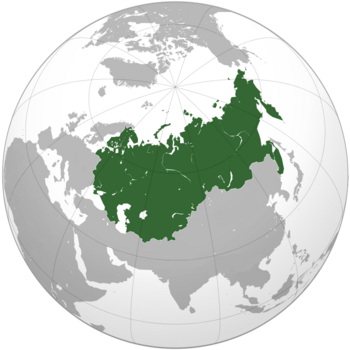Pavlovsk
Federated People's Republic of Pavlovsk Федеративная Народная Республика Па́вловск | |
|---|---|
|
Flag | |
| Motto: "Бережливость хороша, да скупость страшна." (Pavlovski) ("Economy is Good, Greed is Bad" or "Economy is a good servant, but a bad master.") | |
 | |
| Capital | Chekhov |
| Official languages | Pavlovski, Kazakh, Finnish |
| Recognised national languages | Pavlovski, Kazakh, Finnish, Uzbek, Georgian, Azerbaijani, Latvian, Kyrgyz, Tajik, Armenian, Estonian |
| Ethnic groups |
|
| Demonym(s) | Pavlovski |
| Government | Unitary One-Party Socialist Republic |
| Legislature | National People's Congress |
| Formation | |
• Crowning of Truvor | 862 |
• Establishment of Pavlov' | 880 |
• 1300 | Duchy of Chekhov |
• Tsardom of Pavlovsk | 1547 |
• Empire of Pavlovsk | 1721 |
• People's Federated Republic of Pavlovsk | 19 October 1917 |
| Population | |
• Estimate | 316,730,819 (3rd) |
| GDP (nominal) | estimate |
• Total | USD 1,925.67 Bn |
| Currency | Ruble (RUB) |
| Time zone | UTC +2 to +12 |
| Driving side | right |
| Calling code | +669 |
Pavlovsk, officially the Federated People's Republic of Pavlovsk (Pavlovski: Федеративная Народная Республика Па́вловск Romanization: Federativnaya Narodnaya Respublika Pávlovsk), is a transcontinental country spanning Eastern Europe and Northern Asia. From north-west to south-east, the nation is directly bordered by Sundsvall, Lubilia, Carpathia, Oghuz, Samarra, the Afghan Republic, the Persian Sultanate, the Steppe Confederacy, Turan, Songjiang, and the Joseon Empire. It shares maritime borders with Japan at the Tartar Strait, and with the Niagara Union at the Bering Strait. Pavlovsk is the largest country in the world by area, covering over one-eighth the world's inhabited land area, and spanning eleven time zones.
History
Geography
Climate
Environment
Politics
The constitution of Pavlovsk states that the Federated People's Republic of Pavlovsk is "a united socialist state under the leadership of the working class and based on the alliance of workers", and that the state will "apply the principles of communism as it sees fit." Historically, different eras of leadership have implemented the "principles of communism" in vastly different ways. Its current political, ideological and economic system is that of "Rykovian Socialism", which has been termed by its advocates as "reformed socialism", "socialism with democratic characteristics", a "socialist market economy", and a "market economy which pursues communist ideals".
Governance
Foreign relations
Economy
Energy
Industry
Infrastructure
Transport
Demographics
Education
Religion
Culture
Music and art
Cuisine
Sports
This article is from APSIA 1.2. For the most recent iteration of APSIA, look at Category:APSIA 2.B |

